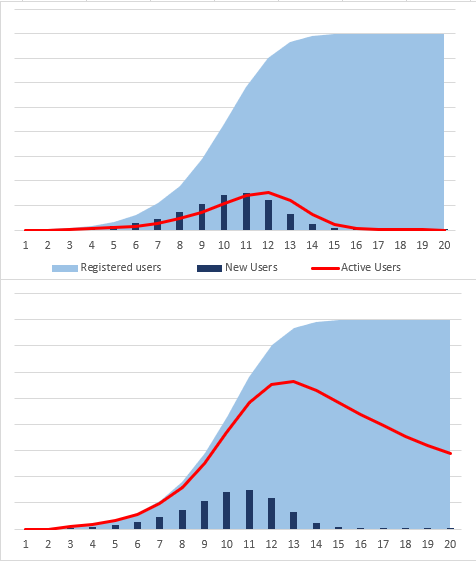- ARPDAUPosted 13 years ago
- What’s an impressive conversion rate? And other stats updatesPosted 13 years ago
- Your quick guide to metricsPosted 13 years ago
Does Zynga intentionally kick players out of its games after two months?
At the Gamification Shoreditch conference last month, Raf Keustermans said that Zynga had a duration of only two months.
That means that the average user only stays playing any one of its games for two months before they quit. Raf used this to suggest that even Zynga, the doyen of social games, can’t keep players and has to spend heavily not just on advertising for customer acquisition, but advertising for customer retention.
I’ve been thinking hard about this, and something doesn’t ring true.
Zynga is the best, most profitable, large social games company on the planet. It is believed to be generating over $850 million in revenues with a margin of nearly 50%. TechCrunch says that Zynga is paying Facebook $30 million a month for its share of Cityville spending alone, implying that Cityville is currently making $100 million in revenue a month.

How can a company that is doing so well succeed when it is losing customers so fast?
Averages hide the truth
My hypothesis (and it is just that, I have no proof) is that, as so often in social games, averages hide the truth.
Imagine a scenario that plays out like this:
- You arrive at Cityville and play for a few weeks.
- Every time Zynga invites you to “come back tomorrow, spam your friends or spend some money” you elect to come back tomorrow.
- After one month, Zynga concludes you have such a low likelihood of buying a virtual item in Cityville, it starts pestering you to leave, and go and play one of their many other Facebook games instead.
It looks, to an outsider, as if you got bored of Cityville and left. What actually happened was that Zynga shifted you into a different funnel.
Compare that to the committed Cityville player who is spending money regularly, inviting new players and keeping their friends active in the game. Zynga works hard to keep them engaged, spending and within the game for many months.
It’s about segmenting your audience
So it’s possible that the two month duration is a sign of Zynga’s strength, not its weakness. It isn’t suffering a retention problem; it is sophisticated enough to be able to recognise a “low likelihood to pay” customer and transfer them into another game in the hope they will convert better over there.
I’m not saying this is what Zynga is doing. I have no specific insight.
But I am saying that this makes more sense to me than to assume that Zynga is just rubbish at keeping players engaged.












